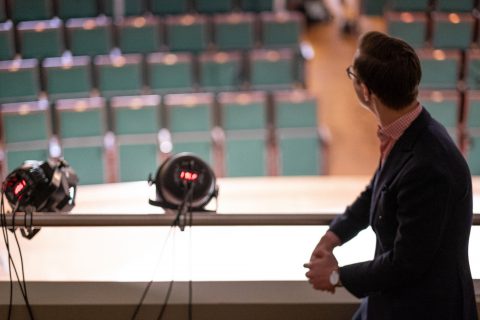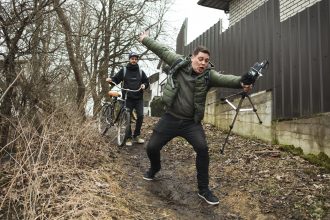“Lend your ears to the dreamy works of Lithuanian composer Žibuoklė Martinaitytė,” This is how Richard S. Ginell, a music critic from the USA, named his article about Saudade, the third album of Žibuoklė Martinaitytė, the winner of the Government’s Culture and Art Prize. As the composer, who was born in Kaunas but is living in Manhattan and looking at the Hudson Rover every day will emphasize later, listening to the same works, again and again, is a highly recommended practice. So, listen to Saudade (you can find the album on Spotify), released by the Finnish record label Ondine, and… well, don’t close your eyes yet.
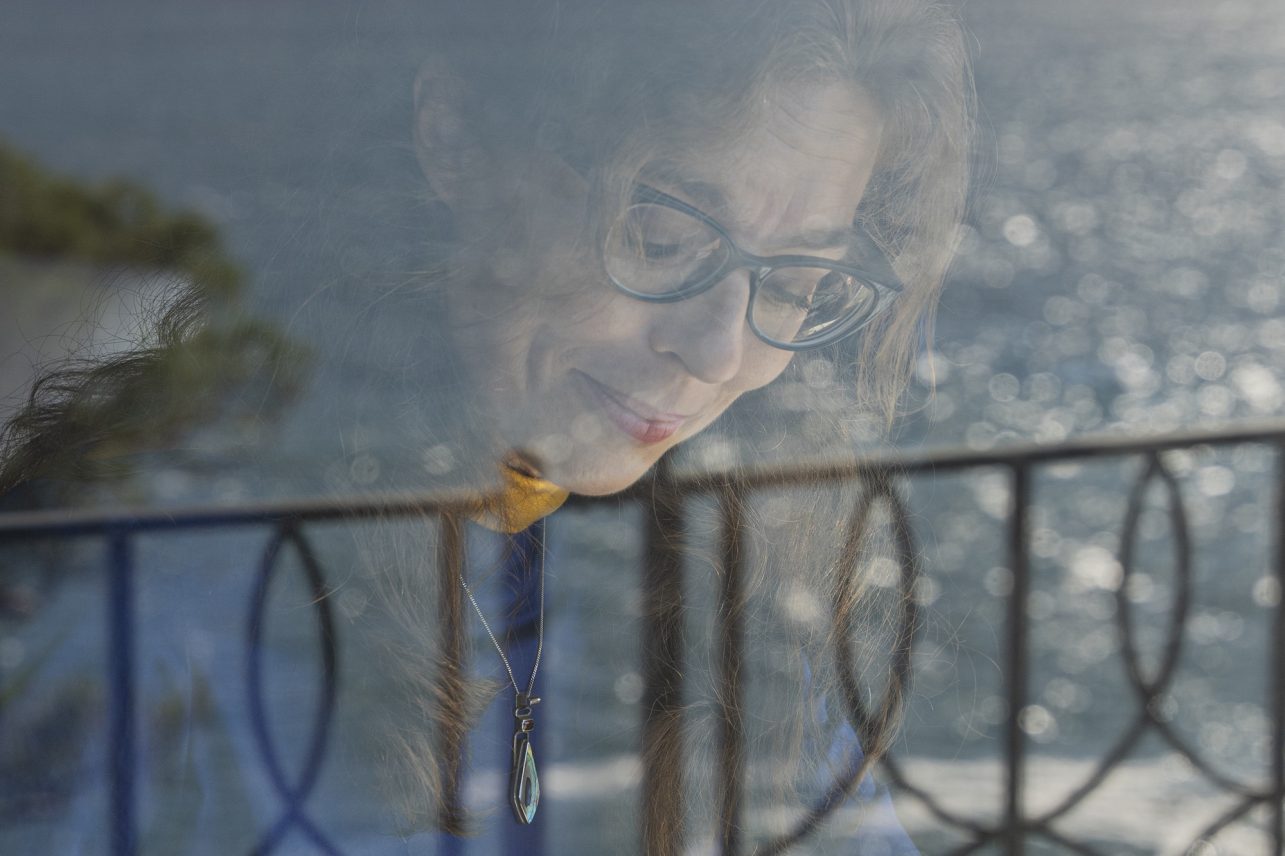
Where did you grow up in Kaunas, Žibuoklė?
I was born in St. Petersburg, then Leningrad, and we returned to Kaunas with my parents when I was five. We lived in Aukštieji Šančiai. Unfortunately, as a child, due to a very busy schedule and heavy workload at J. Naujalis Music School, which I entered when I was six years old, I did not have much time to play with friends. I would only see my neighbourhood in the morning and in the evening as I returned home from school, from the station or via the overpass. These are the two places in this area that I am most familiar with. Physically, I spent more time in the Old Town than in Šančiai, staying at school until 6-7 p.m.
The Naujalis period with classmates and teachers seems very interesting. Do you carry a part of Naujalis in you?
I feel a certain nostalgia for the past and especially for the period when I went to school. The whole situation was quite romantic, the school was in the old town, right next to the Maironis monument, in the building of amazingly beautiful architecture, where the music was being played all the time. It was such a stark contrast to the Soviet reality that I wanted to go to school to not to be in that matchbox-sized five-story apartment building. Although the schedule was busy, the music itself was liberating. All the students in our school were freer – or at least that’s what we thought – than those other kids who went to normal schools. We could dress differently, receive scholarships, be independent, more individual.
When you studied in the piano class, did you have the desire and time to rebel with your classmates, to listen to modern music, rock?
Classmates, especially guys, really enjoyed listening to a variety of music. But to be frank, I didn’t. I only listened to that music as much as my classmates banged on the piano and played those rock and metal songs in class. Mostly I listened to classical music.
At home too?
While my brother lived with us, the music was much more diverse, but then he left for the army and I was left alone. Then, the turntable became mine and all the records I listened to were of classical music. I could listen to the same record over and over again. If I had put on Bach’s Mass in B minor, I would listen to it several times in a row. My parents were worried, thinking if there was anything wrong with me, how much can one listen to that Mass? And you know, the more you are familiar with a piece of music, the more you react to it, the more you wait for specific parts; that experience is deeper than if you listened to it once. The only difference is that all those rock or pop songs last a few minutes, but classical works have two sides of the record, last more than an hour.
And what is your parents’ relationship to music?
Dad was incredibly musical, but not a professional. He sang beautifully had a very good ear, played the accordion, even conducted some choirs, despite being self-taught. He helped me a lot because we didn’t have a metronome at the time, so dad would sit down and beat his foot rhythmically, being my metronome. It’s a terribly tedious job but he must have really wanted me to continue studying music.
In Vilnius, the current Lithuanian Academy of Music and Theatre, you had the good fortune to study with such personalities and fantastic composers as Bronius Kutavičius and Julius Juzeliūnas. How were they like as teachers? Did they serve as guides, who suggested directions and opened up the world of music to you more broadly? How did the studies go?
They opened up that music world more. I also like Kutavičius’ music – I spent two years studying with him – he is a really brilliant composer. But it all depends on the personal relationship between the teacher and student. There must be an indescribable connection that would allow you to open up in order to accept the information that the teacher provides. You have to trust that person and believe in them. I would say that my connection with Professor Juzeliūnas was stronger or maybe I was more mature then and things were easier to accept. Professor Juzeliūnas greatly promoted freedom and individuality; he did not limit any music style. He would make remarks but wouldn’t pay attention to different style, wouldn’t limit stylistic decisions.
When you applied to the academy, you had already written a symphonic work. It is interesting that you started writing for the orchestra so early. Do you create chamber music, or pieces for one instrument? Or you think that your ideas are best conveyed by the totality and harmony of instruments?
I do create a lot of chamber music both for solo instruments and for two or three. After all it is a more popular genre than orchestral music. But with age, I start to realize that my stylistics is best expressed through orchestral music, because I really like to layer certain things, and the more instruments you have, the more layers you can create. That’s why I think that orchestral music is my favorite instrument. I write for it whenever I get the chance.
Do you classify yourself as a contemporary or an academic composer? How exactly should we call you?
Both titles are OK. What is contemporary music? The one that is being written now. What is academic music? The one that comes from a certain classical tradition. It is created by a person who has studied, who has delved into all its aspects, elements and principles of formation. Academic music is not necessarily narrow-minded or inaccessible to others, it is rather more indicative of a person’s education.
How demanding are you when it comes to recording? Do you have a lot of discussions with performers, conductors, bandleaders, sound directors? I have seen that last summer, you recorded Saudade with Baltic Mobile Recordings (both of the members had been featured in our magazine).
Yes, Vilius and Aleksandra Keras are perfect sound engineers. Not only is it a pleasure to work with them, but they are also extremely demanding. Not for the composer, but for the musicians. They only need attention from the composer, but demand everything, down to the smallest detail, from the musicians. As a composer, I might not even dare to make technical remarks during the recording process that seem minute or devote a lot of time to playing one chord together… I am more concerned with that music happening, I want to make it flow, sound magical. Aleksandra Kerienė is very demanding, she records everything with a score. Such a combination of a composer, who is trying to see the big picture and a sound director who demands precision can be successful. I was extremely fortunate to be able to work with such musicians and sound directors. I especially want to praise conductor Giedrė Šlekytė, because our Lithuanian National Symphony Orchestra sounded fantastic in the hands of this young conductor. I will honestly admit that I haven’t heard this orchestra sound as good as in those recordings. Maybe they were trying very hard, or perhaps it was the charismatic personality of the conductor, I don’t know, but there was something special in the air. Or maybe because after the first wave of quarantine everyone had really missed the music and playing together.
How to measure that success of music? Your biography is full of grants, concert halls, albums and awards but what makes you realize that you did a good job?
I never think I did the best job. That engine drives and pushes you forward because you’re never completely satisfied. You know you can do better; you know it’s possible. Is it the pursuit of perfectionism that has been in place since childhood, or maybe an inferiority complex? Even so, in this case, it is very useful because you are trying to surpass yourself. You try to make each piece a step forward in your trajectory, not necessarily in the eyes of others. And what is success? I think that success is when you can do what you want and get paid for it. When you have enough bookings and enough freedom to implement those ideas, when no one limits you to orders that you would work on only because of money.
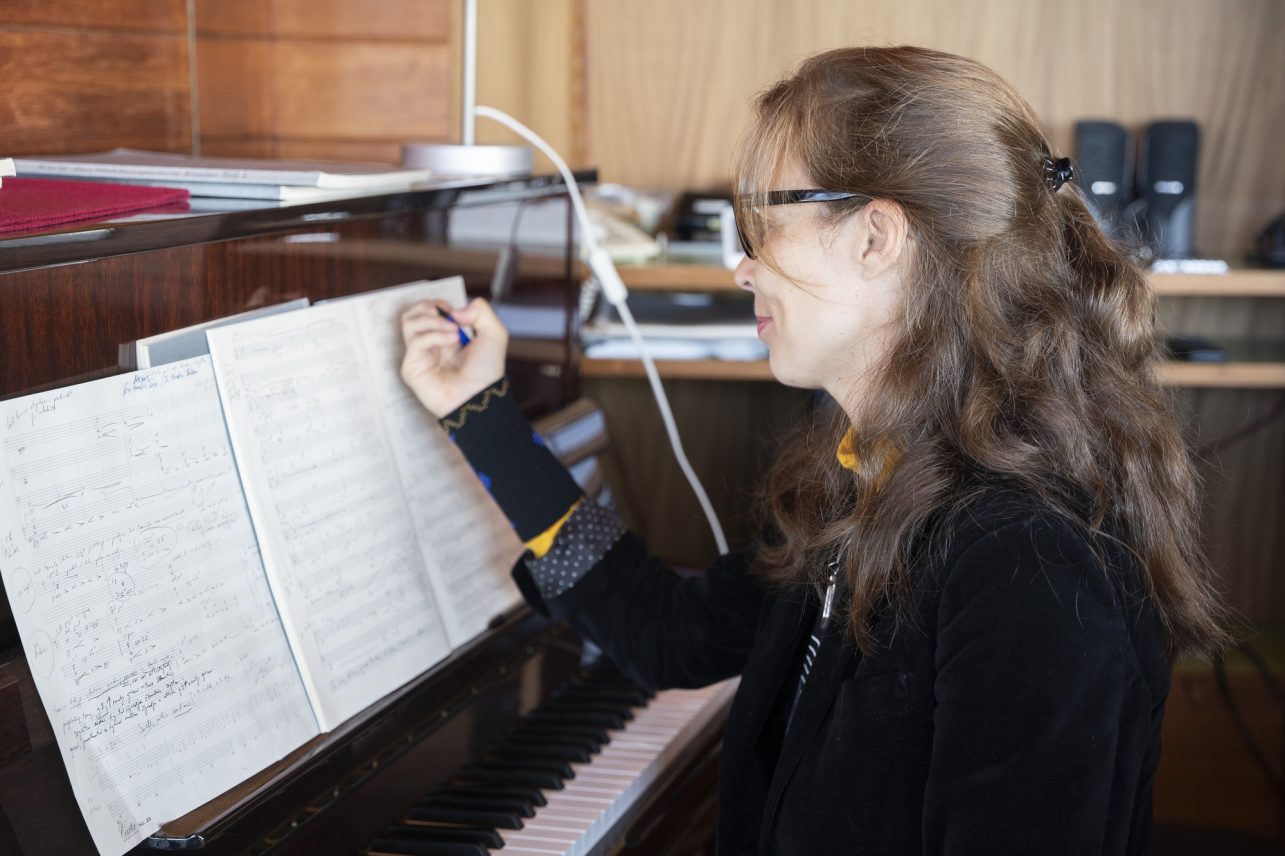
As for your album and track “Saudade”, I prefer the German word weltschmerz, which I think carries a similar meaning. It is difficult to briefly describe that indescribable sadness and obscure longing in Lithuanian. I would venture to say that when you created Saudade, you foretold the period we have been living in for a year now.
The idea itself visited me in 2019. At the beginning I wondered why precisely this idea, after all it is so abstract and did not fit my life at the time. This was commissioned by Gaida Festival. After that the idea did not stop haunting me and only after I had written the piece, I looked at it and couldn’t believe that it was, simply put, so dark and sad. I thought about why and whether anything was happening with me but then decided that if this music came to me, then it should stay. Then I heard the premiere performance and realized that maybe something difficult will happen in my life, or in the life of my loved ones, perhaps a death or something like that because it really seemed very prophetic. And now we know – it was just a feeling of the time to come. Artists are very sensitive; we can catch hints of things to come without even naming them for ourselves. You just catch that feeling without knowing what it means and then realize it later. Although, I don’t know if anything would change if you understood it right away.
I will admit, I heard that piece during a really difficult moment of quarantine in January, and it revived me, gave me hope.
Yes, that is its form. A very active onslaught begins on the second half. And in that onslaught the life force lies. Not necessarily a simple optimism but a strong vital energy that will definitely take you out of that darkness and bring you into something, but not necessarily the light.
Hope.
Yes, hope.
During our conversation you are wearing blue. I also hear the color blue in your work. It is encoded in your name and your album covers and titles. How do you see, hear and feel that color blue? Why is it so important in your life?
Of course, it all started with the name and then you work with whatever body and conditions you get. You will not start changing the color of your eyes. If you have blue eyes, then blue naturally becomes the most beautiful color. I associate blue with infinity. Both sky and the ocean or sea seem infinite; even the color of the distance is blue, the mountains in the distance look blue. It’s this impalpability… And that sense of infinity in the color blue, as if it is inexhaustible, has neither a beginning nor an end. This is how I think about music too. Although the tracks have a beginning and an end, there is some kind of music that has been accompanying me through life. It is not clear to me yet, to which direction its going, but there is that sense of infinity. I float in that music as if in the ocean and whatever I can, I pass on to others.
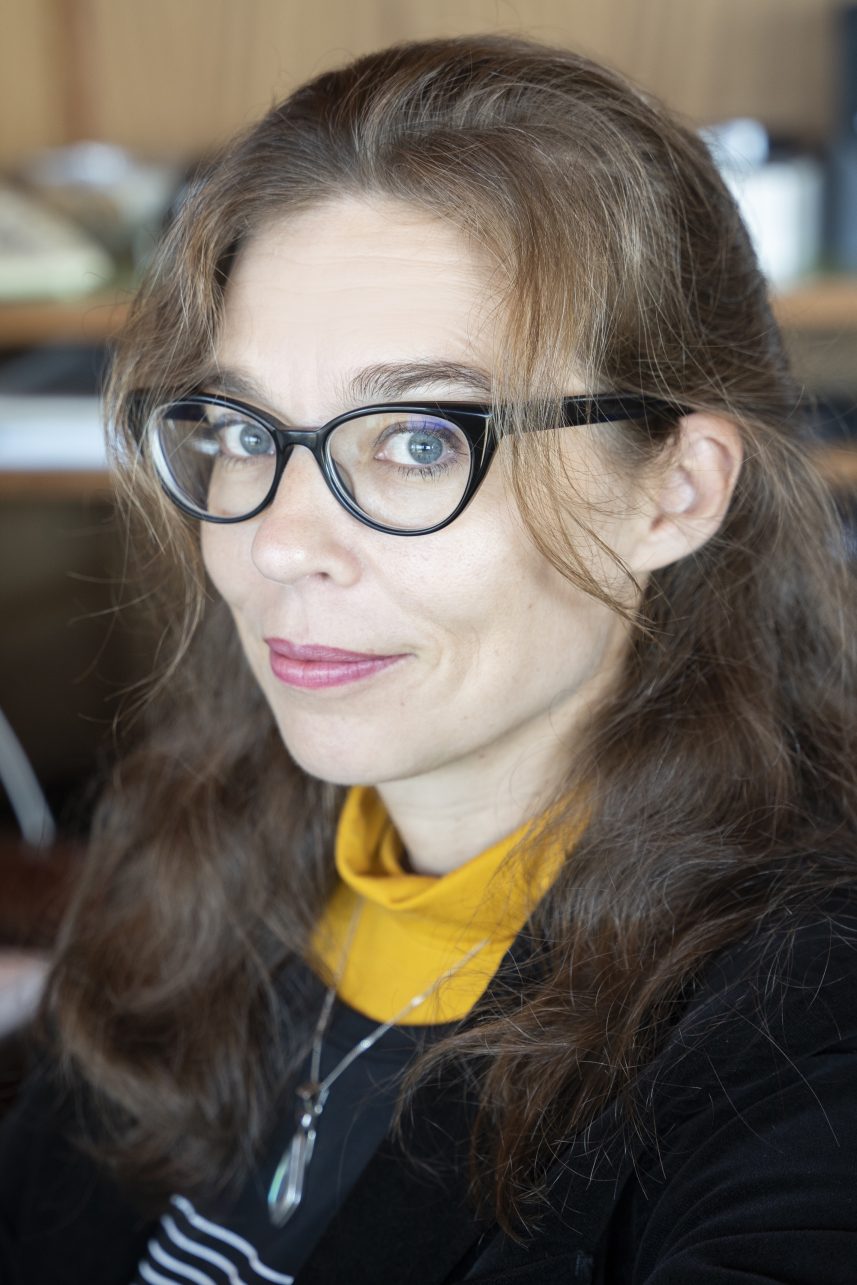
If you had the opportunity to organize a concert of your music in an open space in Kaunas, which spot would you choose? If the weather and other conditions were favorable.
At the confluence of two rivers, the Nemunas and the Neris, it is such a special place.
So that we would be surrounded by blue from all sides?
Yes, after all the sky is also blue.

